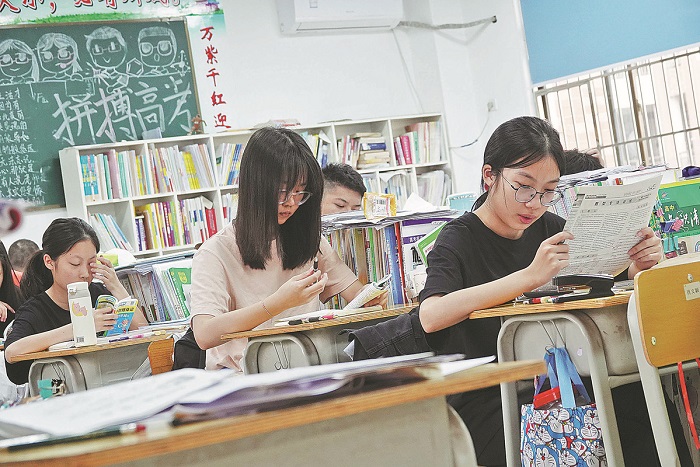Additional points policy gets tougher

Students at Dongmeng High School in Nanning, Guangxi Zhuang autonomous region, prepare for the gaokao. [Photo by Yu Xiangquan/For China Daily]
Stricter requirements make it harder for students to get bonus marks on gaokao
The policy of giving additional points to students from minority ethnic groups during gaokao, the national college entrance exams, has been either canceled or adjusted by provinces in recent years to promote exam equality and more precise protection for candidates in remote areas, experts said.
Chen Zhiwen, a member of the China Society of Education Development Strategy, said the stricter requirements put in place for minority students seeking to take advantage of the policy is the result of the improving education situations of such students and efforts to prevent potential cheating in the admissions process.
Earlier this month, the Henan provincial government released its latest policy regarding the awarding of additional scores during this year's gaokao, stipulating that candidates from minority ethnic groups will not receive such points.
Meanwhile, groups such as children of martyrs, self-employed veterans and returned overseas Chinese may still qualify for the additional points, which range from 5 to 20.
The provinces of Fujian, Guizhou and Hunan have also gradually adjusted their version of the policy for minority students in recent years.
Fujian reduced additional points granted from 10 to 5 in 2021 and narrowed qualified candidates to those in remote villages, mountains or islands. The province will cancel its policy starting with the 2026 gaokao, according to a notice released in 2020.
The Inner Mongolia autonomous region has divided its 103 county-level regions into two categories and will implement more precise policies for the areas, according to a 2021 notice.
Minority students from the 36 Category A regions, mainly border and pastoral areas, will keep receiving 5 additional points after 2026, while gaokao candidates from the remaining Category B regions will no longer be qualified to receive them, the notice said.
"The educational rights of ethnic students are still being protected, but in a more targeted and precise way," Chen said.
Students who take the gaokao are given the option of taking liberal arts exams or science exams, depending on what major they intend to pursue.
In 2009, He Chuanyang, the top gaokao scorer in liberal arts in Chongqing, was reported for falsely claiming to be a member of an ethnic minority group, and his admission to Peking University was rescinded.
It turned out that He's father, concerned that his child might have a disadvantage due to being a member of the Han majority ethnic group, lied about He's ethnic identity so that the young man would receive bonus points, even though He would still have been the top scorer without them.
A similar incident that occurred in Guizhou in 2018 appeared to spark efforts to adjust the additional points policy, Chen said.
The top three gaokao scorers in liberal arts in Guizhou that year were all Han students, but they almost missed an opportunity to attend Peking University because a group of students from other ethnic groups received 20-point bonuses, giving them higher marks than the Han students.
"Since then, the policy has been comprehensively adjusted. After a two-year transition period, the ethnic bonus points are being managed more accurately," Chen said.
The requirements to qualify for the ethnic bonus points have become increasingly stringent, with eligibility limited to certain regions, including pastoral areas where candidates have studied continuously for three years.
"Those who grew up in urban areas are basically ineligible," he said.
The magnitude of additional points has been greatly reduced. The most anyone can receive is 10 points, and more commonly 5 points or even 3 points depending on the region.
"After 2026, ethnic minority candidates in many regions will no longer receive bonus points," he added.
Zhang Mou, an official with the National Ethnic Affairs Commission, said during a news conference in 2022 that the bonus points for ethnic minority students were initially intended to help those from less-developed regions gain better access to educational opportunities.
One of the reasons for adjusting this policy is that basic education in China has become more balanced, and the educational resources available to ethnic minority students are continuously improving, he said.


